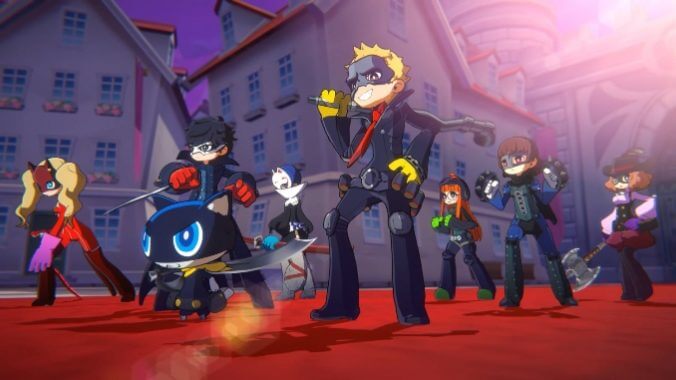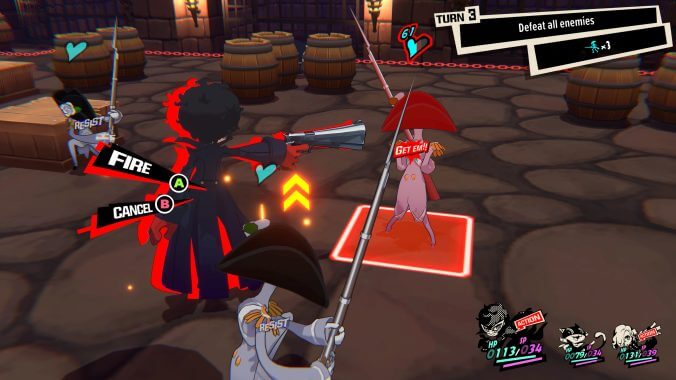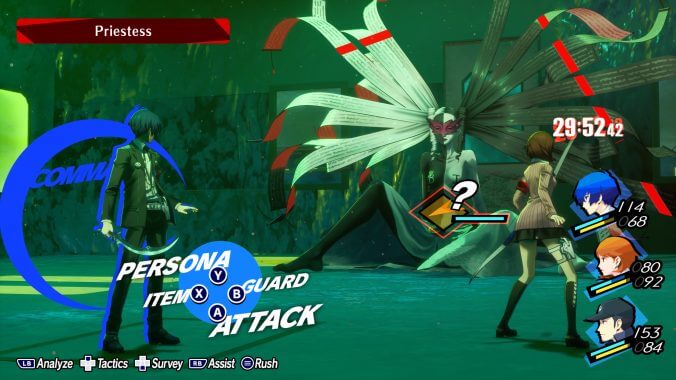Persona 5 Tactica and Persona 3 Reload Prove Persona 5‘s Influence Has Grown Too Strong
Games Features Persona
The Persona series is most definitely on the cusp of another moment. It just may not be the one that Atlus expects. The franchise has exploded in North America since Persona 4 arrived late in the PlayStation 2’s lifecycle in 2008, with the portable version Persona 4 Golden leading to another surge in popularity when it came out on the Vita a few years later. Since then the series has encroached on the culture to a point that feels outright invasive. Persona 5 was a bonafide hit before it even hit the states in the spring of 2017, launching its own sub-series that so far has yielded a musou title, a rhythm game, and its own Golden-style re-release via Persona 5 Royal, among too many expansions and detours into other media to rattle off here. A proper numbered sequel is almost assuredly in development alongside Metaphor: ReFantazio, a similar RPG coming from much of the top brass behind Persona’s string of successes… and yet we’re not there yet. Instead, Persona fans are being treated to a pair of pleasant (if obviously stopgap) surprises, if my time with them is anything to go by: Persona 5 Tactica and Persona 3 Reload. Though both are ultimately promising, their existence does beg questions that the now overexposed franchise may not be up to task to answer.
Coming at the tail end of this year and the beginning of the next respectively, Persona 5 Tactica and Persona 3 Reload are an interesting pair of releases. P5 Tactica takes by now familiar characters and drops them into a new mold in a bid at both old and new audiences. Persona 3 Reload on the other hand is what folks have been clamoring for since presumably finding the Persona series in its later upswing. It’s a ground-up remake of the third entry—which has developed a sterling underdog reputation in the time since its 2006 release— in Unreal Engine that’s deliberately trying to play the hits. The promise of Persona 3: Reload is supposedly to deliver the original game to an audience who have seemingly outgrown its original incarnation. Together they’re an obvious one-two hit that should play like gangbusters with the fanbase, potentially pushing Persona into yet another stratosphere on its meteoric ascendance while we wait for the next true sequel.
It won’t be a rise without some bumps though. Neither title is as fresh or familiar as you might expect. Tactica is about the umpteenth dalliance into the life and times of the Shibuya crew—the Phantom Thieves—whose story I thought was well and truly done back in 2017 when I spent 100+ hours with them. Boy, was I wrong, as Tactica brings the series into the realm of strategy RPGs with a chibi-adjacent art style, a new story, and a fresh cast of characters alongside the returning crew. A welcome change of pace and new POV can’t change the fact however that these primary characters, for all their charms and quirks, are worn and tired. And for all the changes that Tactica should and does introduce, it’s hard not to see it as Persona 5 simply grafted onto a different genre.

For example, much of how Tactica plays will be familiar to Persona 5 fans, because most of the UI and commands are identical. You have a base attack, spells granted to you by your Persona, and a gun, all functioning as aesthetic stand-ins for elements that strategy RPGs already support. Spells have new effects to them, like the wind element spell Garu having knockback, but this again is already a staple of the genre less than it is a clever reinvention on part of the property and the team behind it. A focus feature, which boosts and augments the abilities of your character if you have them wait rather than take an action on their turn, is the exception in this case rather than the standard. The Persona 5 of it all is more an aesthetic and the promise of a certain cast more than it is a philosophy that deeply informs the DNA of the game. For that reason, I was both mildly charmed by my preview of the title and left asking if there was any more to it than what I’d played.
That isn’t to say that Tactica doesn’t feel good to play or isn’t fun in its own right, because it does and is. I just couldn’t help wondering whether or not I enjoyed my time with it because it was as bold as Persona 5 felt or because it felt too comfortable and maybe even a touch unambitious.

Though Tactica feels off for how little seems to have changed, Persona 3 Reload is strange for the inverse: so much of its own identity feels like it’s been stamped out in lieu of this Persona 5-inspired facelift and this fixation on making it “new.” New in this case though means refashioned in the vein of another game, which has in turn arrested Persona 3 Reload‘s development. News of the game’s voice cast being overhauled formed the first ripples. Then there was the confirmation that FES, Persona 3‘s much-lauded expansion (in the way Persona 4 Golden and Persona 5 Royal could be considered expansions) that provided the original game with a purportedly better ending, was excised from the remake. Smaller details, like the menu being styled differently in Reload, mark the influence Persona 5 has retroactively exerted over the series as it’s grown into the new standard. By the time it was made clear that the female protagonist from Persona 3 Portable (listen, this game has been revisited a few too many times) was not going to be included—reportedly because the team prioritized remaking the original game rather than the whole of the work that went into it and its rereleases—it became quite obvious that Reload was becoming a relic in its own right. Looking at it plainly, it’s less a remake that imagines “what if the game looked and ran better” and more of a re-do, as evidenced by the introduction of new scenarios to the game’s script.
Sure, Persona 3 is still there in function, but buried under a confluence of decisions that doubtlessly erases the luster of playing the game people have talked about for damn near two decades. For newcomers like myself, you’re getting an experience that you’d like to compare to the OGs…but you can’t. In Persona 3 Reload‘s numerous translations, it straight up transforms into something else. Something that might still be good, something that’s still stylish, and according to my close call boss fight, something still punishing if you don’t know what you’re doing, but still something else. And though yes, Persona 3 Portable is now widely available as of this year, it’s a bit of a shame this upcoming revision seemingly skirts the game’s long legacy for vanity.
Looking at either game, and the slew of Persona releases since 2017, Persona 5 appears to be a creative nadir—rather than, say, a spark—that the team behind it has either had a hard time moving past or otherwise been reluctant to. It’s like a mutagen, overwhelming everything around it in its spread. Persona 5 Tactica and Persona 3: Reload are just its latest victims.
Moises Taveras is the assistant games editor for Paste Magazine. He was that one kid who was really excited about Google+ and is still sad about how that turned out.